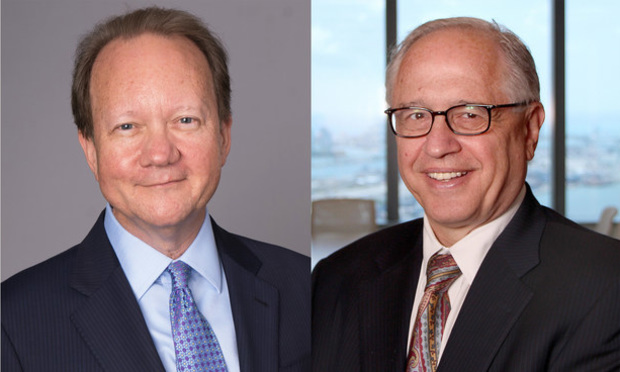What Are Dentons and Greenberg Traurig Arguing About, Anyway?
Dentons says it wants to be the first "national" law firm. Greenberg Traurig says there already is one—and you're looking at it. Now Greenberg executive chairman Richard Rosenbaum is calling for a truce.
October 18, 2019 at 03:32 PM
4 minute read
 Dentons global chair Joe Andrew, left, and Greenberg Traurig chair Richard Rosenbaum. (Courtesy photos)
Dentons global chair Joe Andrew, left, and Greenberg Traurig chair Richard Rosenbaum. (Courtesy photos)
What does it mean to be a "national" law firm?
Dentons global chairman Joe Andrew and Greenberg Traurig executive chairman Richard Rosenbaum have been hashing out the question in dueling letters published in The American Lawyer this week, each leader implicitly—or not-so-implicitly—critiquing the other.
The claim that no truly "national" U.S. law firms yet exist was central to Dentons' splashy announcement two weeks ago unveiling its latest growth strategy. The global giant is targeting combinations with existing firms all across the U.S. to dramatically increase its American footprint.
Rosenbaum—whose firm already boasts 31 U.S. offices, more than any of its rivals—disagreed. He described Greenberg Traurig's "march" from Miami, through Florida, to New York and then across the rest of the nation that started in 1984.
"We have done it as one unified firm," he said in his letter Tuesday, which did not name Dentons but left no doubt as to whom he was referring.
Dentons leadership has been explicit about its "dual partnership" model for adding new constituent firms in the U.S. Stopping short of full integration, Dentons argues, avoids the risk and time expenditures that lateral growth or complete mergers would entail.
"Lawyers are able to protect and promote the culture of their firms while also becoming partners in a national partnership that incentivizes them to work collaboratively and has a single global conflict policy, national training and recruiting programs, one set of engagement terms, one know-your-client policy and one bill, all while partners share a commitment to quality and ethics that puts clients first," Andrew said in his response to Rosenbaum.
Andrew added that it has taken 35 years for Greenberg to assume its current geographic profile, suggesting that his firm's current and future clients want wider coverage across the country now. He cited the Russell 3000, the index of the 3,000 largest publicly traded companies in the U.S., the vast majority of which sit outside the country's 10 largest law markets.
While the Big Four, which all have at least 79 offices across the country, are serving these countries on a truly national scale, no law firm is doing so, at least not yet, Andrew argued.
In stating that Greenberg is a "unified" firm, Rosenbaum implicitly took aim at the perceived looseness of the Dentons model.
"This is a 'people' profession. We are not selling cars or software," he said. "People must be carefully selected and make their selections, know and trust each other and become well-integrated and aligned. These things don't happen overnight."
Andrew's answer: "People are different in different cultures and places."
"Trying to do the 'hard work' of making every office the same is like setting up a franchise where you want the hamburger to always be the same, rather than providing the best local cuisine that is appropriate for the place," he added.
While defending a more traditional growth model, Rosenbaum is hardly a hidebound traditionalist. Earlier this year, when Greenberg announced its own innovation-focused subsidiary, he likened the new venture, Recurve, to Uber and Airbnb, describing it as a platform where law firms and their clients can come together with providers of legal tech services, nimble staffing and real estate experts, artificial intelligence purveyors, and more.
And in a letter to The American Lawyer on Thursday night that began "Don't shoot the messenger," he said it was time to end the discussion.
"As we are all seeing enough politics on television (are you or are you not going to raise taxes on the middle class?), we have now presented the facts, enough said. Clients and talent can determine which ring true," Rosenbaum wrote. "But let's stay cool and avoid the personal attacks, they are beneath you, even when you have no other answers. I wish you well."
Read More
Greenberg Traurig Chair Takes Aim at What Makes a Truly National Firm
Dentons' Leader Fires Back at Greenberg's 'Parochial and Condescending' Criticisms
Dentons Chases Big 4′s Footprint With New US Strategy
Dentons Combines With Two US Firms in One Go, Launching New American Strategy
This content has been archived. It is available through our partners, LexisNexis® and Bloomberg Law.
To view this content, please continue to their sites.
Not a Lexis Subscriber?
Subscribe Now
Not a Bloomberg Law Subscriber?
Subscribe Now
NOT FOR REPRINT
© 2025 ALM Global, LLC, All Rights Reserved. Request academic re-use from www.copyright.com. All other uses, submit a request to [email protected]. For more information visit Asset & Logo Licensing.
You Might Like
View All
Paul Hastings, Recruiting From Davis Polk, Adds Capital Markets Attorney
3 minute read
Kirkland Is Entering a New Market. Will Its Rates Get a Warm Welcome?
5 minute read

Goodwin Procter Relocates to Renewable-Powered Office in San Francisco’s Financial District
Trending Stories
Who Got The Work
J. Brugh Lower of Gibbons has entered an appearance for industrial equipment supplier Devco Corporation in a pending trademark infringement lawsuit. The suit, accusing the defendant of selling knock-off Graco products, was filed Dec. 18 in New Jersey District Court by Rivkin Radler on behalf of Graco Inc. and Graco Minnesota. The case, assigned to U.S. District Judge Zahid N. Quraishi, is 3:24-cv-11294, Graco Inc. et al v. Devco Corporation.
Who Got The Work
Rebecca Maller-Stein and Kent A. Yalowitz of Arnold & Porter Kaye Scholer have entered their appearances for Hanaco Venture Capital and its executives, Lior Prosor and David Frankel, in a pending securities lawsuit. The action, filed on Dec. 24 in New York Southern District Court by Zell, Aron & Co. on behalf of Goldeneye Advisors, accuses the defendants of negligently and fraudulently managing the plaintiff's $1 million investment. The case, assigned to U.S. District Judge Vernon S. Broderick, is 1:24-cv-09918, Goldeneye Advisors, LLC v. Hanaco Venture Capital, Ltd. et al.
Who Got The Work
Attorneys from A&O Shearman has stepped in as defense counsel for Toronto-Dominion Bank and other defendants in a pending securities class action. The suit, filed Dec. 11 in New York Southern District Court by Bleichmar Fonti & Auld, accuses the defendants of concealing the bank's 'pervasive' deficiencies in regards to its compliance with the Bank Secrecy Act and the quality of its anti-money laundering controls. The case, assigned to U.S. District Judge Arun Subramanian, is 1:24-cv-09445, Gonzalez v. The Toronto-Dominion Bank et al.
Who Got The Work
Crown Castle International, a Pennsylvania company providing shared communications infrastructure, has turned to Luke D. Wolf of Gordon Rees Scully Mansukhani to fend off a pending breach-of-contract lawsuit. The court action, filed Nov. 25 in Michigan Eastern District Court by Hooper Hathaway PC on behalf of The Town Residences LLC, accuses Crown Castle of failing to transfer approximately $30,000 in utility payments from T-Mobile in breach of a roof-top lease and assignment agreement. The case, assigned to U.S. District Judge Susan K. Declercq, is 2:24-cv-13131, The Town Residences LLC v. T-Mobile US, Inc. et al.
Who Got The Work
Wilfred P. Coronato and Daniel M. Schwartz of McCarter & English have stepped in as defense counsel to Electrolux Home Products Inc. in a pending product liability lawsuit. The court action, filed Nov. 26 in New York Eastern District Court by Poulos Lopiccolo PC and Nagel Rice LLP on behalf of David Stern, alleges that the defendant's refrigerators’ drawers and shelving repeatedly break and fall apart within months after purchase. The case, assigned to U.S. District Judge Joan M. Azrack, is 2:24-cv-08204, Stern v. Electrolux Home Products, Inc.
Featured Firms
Law Offices of Gary Martin Hays & Associates, P.C.
(470) 294-1674
Law Offices of Mark E. Salomone
(857) 444-6468
Smith & Hassler
(713) 739-1250









